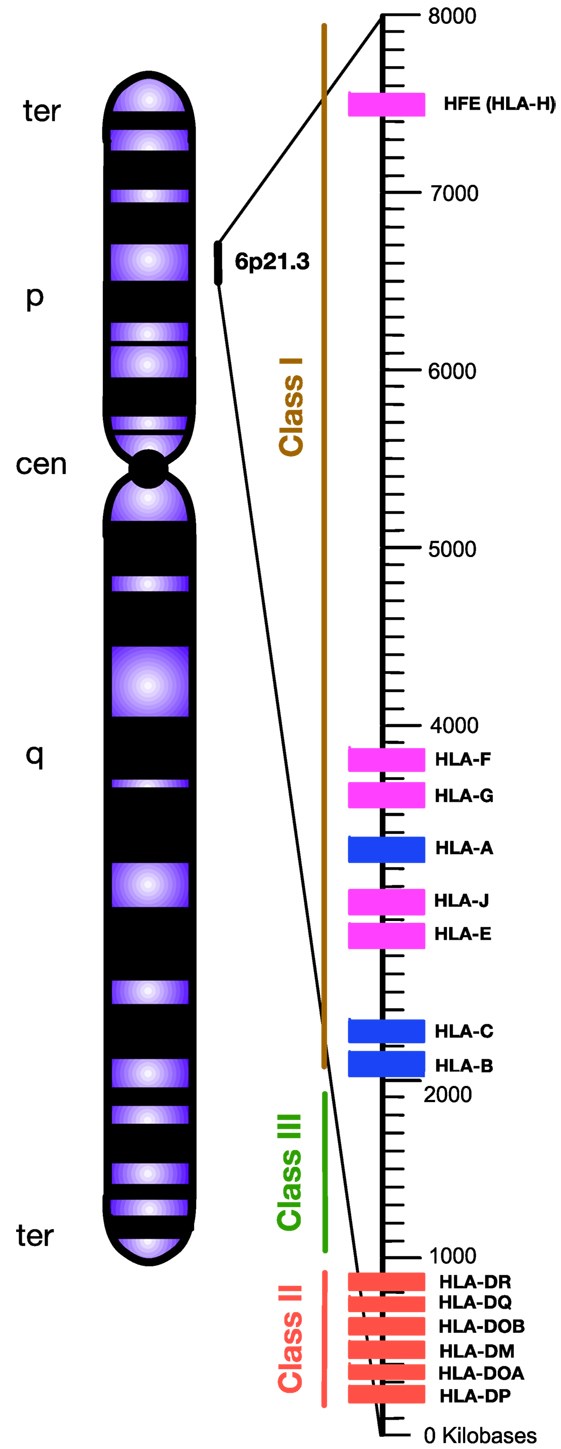Major histocompatibility complex (MHC) is the genetic loci involved in the rejection of foreign organs, and human MHC is called the Human Leukocyte Antigen (HLA). HLA system can cause adverse immunologic effects in transfusion therapy, which is primarily mediated by HLA antibodies developed against the donor leukocytes contained in the cellular blood components. These HLA antibodies induced from alloimmunization episodes including pregnancy, transfusion, or transplant can cause febrile transfusion reaction, platelet transfusion immune refractoriness, and transfusion-related acute lung injury. Creative Biolabs provides a full range of HLA testing services to identify HLA genes and antigens in alloimmunization episodes.
 Fig.1 Simplified diagram of the position
Fig.1 Simplified diagram of the position
and organization of HLA genes.1
HLA is a cluster of gene complexes located on the cell membrane of leukocytes in humans and is controlled by genes located on chromosome 6. Cell surface molecules specialized to present antigenic peptides to the T-cell receptor (TCR) on T cells are encoded by HLA. These cell surface proteins function like responsible for the regulation of the immune system whether humoral or cellular in humans. Therefore, HLA plays an important role in the vertebrate genome regarding infection and autoimmunity, and also is essential in adaptive and innate immunity.
MHC molecules present antigen are divided into the following two main classes:
• Class I MHC molecules
As transmembrane glycoproteins, class I MHC molecules are present on the surface of all nucleated cells. Intact class I molecules consist of an α heavy chain bound to a β-2 microglobulin molecule, and the heavy chain of the class I molecule is encoded by genes at HLA-A, HLA-B, and HLA-C loci. T cells that express CD8 molecules react with class I MHC molecules. These lymphocytes often have a cytotoxic function, requiring them to be capable of recognizing any infected cell. Besides, some class I MHC genes encode nonclassical MHC molecules, such as HLA-G and HLA-E.
• Class II MHC molecules
Class II MHC molecules are present only on professional antigen-presenting cells, thymic epithelium, and activated T cells. Most nucleated cells can be induced to express class II MHC molecules by interferon (IFN)-γ. Class II MHC molecules consist of 2 polypeptides (α and β) chains. Both polypeptide chains are encoded by genes in the HLA-DP, -DQ, or -DR region of chromosome 6. T cells reactive to class II molecules express CD4 and are often helper cells.
HLA testing identifies the major HLA antigens that are present on the surface of an individual's cells and the antibodies to HLA antigens as well as the genes that are responsible for HLA antigens, primarily to match transplant donors and recipients.
HLA Antibody Detection Assay
Creative Biolabs provides a set of HLA antibody detection assay to assess an individual's sensitization status and identifies the antigens specifically targeted by those antibodies.
Non-HLA Antibody Detection Assay
Creative Biolabs provides a set of non-HLA antibody detection assay to assess an individual's sensitization status and identifies the antigens specifically targeted by those antibodies.
HLA Blocking Assay
Antigen blocking test is one of the most common and effective methods to test the specificity of antibodies. Creative Biolabs provides HLA blocking assay to test the specificity of HLA antibodies.
HLA Neutralizing Assay
Creative Biolabs provides HLA neutralizing assay to assess the neutralizing activity of HLA antibodies against virus carrying HLA alleles.
HLA Competition Assay
Creative Biolabs provides HLA competition assay to identify peptides binding to HLA molecules.
As a reliable partner in immunology, Creative Biolabs aspires to become the best solution provider for our clients. We are committed to the HLA testing service and dedicated to reducing the overall project development timeline for our clients. For more information about our HLA testing, please send us an inquiry or contact us directly.
Reference
For any technical issues or product/service related questions, please leave your information below. Our team will contact you soon.
All products and services are For Research Use Only and CANNOT be used in the treatment or diagnosis of disease.
 NEWSLETTER
NEWSLETTER
The latest newsletter to introduce the latest breaking information, our site updates, field and other scientific news, important events, and insights from industry leaders
LEARN MORE NEWSLETTER NEW SOLUTION
NEW SOLUTION
CellRapeutics™ In Vivo Cell Engineering: One-stop in vivo T/B/NK cell and macrophage engineering services covering vectors construction to function verification.
LEARN MORE SOLUTION NOVEL TECHNOLOGY
NOVEL TECHNOLOGY
Silence™ CAR-T Cell: A novel platform to enhance CAR-T cell immunotherapy by combining RNAi technology to suppress genes that may impede CAR functionality.
LEARN MORE NOVEL TECHNOLOGY NEW SOLUTION
NEW SOLUTION
Canine CAR-T Therapy Development: From early target discovery, CAR design and construction, cell culture, and transfection, to in vitro and in vivo function validation.
LEARN MORE SOLUTION